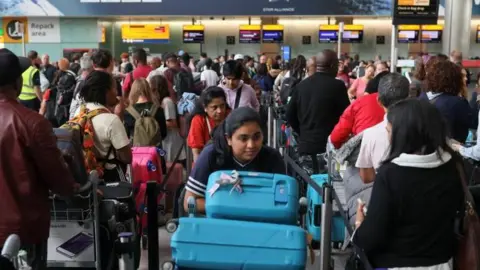Airlines are in an uproar following a significant system outage experienced by the National Air Traffic Services (NATS), which disrupted flights across the UK. The incident, which occurred recently, led to widespread cancellations and delays, affecting not only airline operations but also travelers with urgent plans. The NATS provider has issued an apology, stating that it took around 20 minutes to rectify the issue by switching to a backup system. However, this brief interruption had far-reaching implications for passengers and airline companies alike.
The surveillance failure reportedly resulted in more than 150 flight cancellations, leaving thousands of travelers stranded or forced to make alternative arrangements. EasyJet, one of the major airlines affected, expressed their discontent by labeling the error as “extremely disappointing.” In a more dramatic call for accountability, a senior executive at Ryanair demanded the resignation of NATS’ chief executive, Martin Rolfe, asserting that the systemic issues should have compelled him to step down.
NATS clarified that the malfunction was “radar-related” and emphasized its commitment to ensuring passenger safety by reducing flight traffic during the incident. They also suggested that there is no evidence to indicate the situation was due to cyber-attack. Nonetheless, the UK government stated that it is coordinating closely with NATS to delve deeper into the root causes of this outage.
Executive Neal McMahon of Ryanair did not hold back in expressing his frustration, calling it “outrageous” that ongoing mismanagement at NATS continues to disrupt travel for the passenger populace. He reflected on an earlier incident from August 2023, where a similar outage affected over 700,000 passengers and led to the cancellations of more than 500 flights at prominent airports. McMahon raised the alarm that it appeared no lessons were learned from that experience, leading to recurring problems that continue to plague passengers.
EasyJet’s chief operating officer, David Morgan, remarked on the timing of the disruption, stressing that it was particularly troublesome to witness air traffic control failures during peak travel seasons. He voiced concerns about the immediate need for NATS to provide clarity on how they intend to mitigate similar issues in the future.
Passenger experiences varied greatly in the fallout from the outages. For instance, Sarah McPherson, a traveling mother, expressed her outrage as her son was denied the opportunity to compete internationally with England’s under-15 rugby team due to the unexpected cancellation. Jonathan Carr faced his own disappointment as he sought to attend his brother’s wedding in Norway, which was complicated by the grounded flight, although he remained hopeful of arriving eventually.
Julia Lo Bue-Said, chief executive of Advantage Travel Partnership, described the air traffic management failures as “frustrating,” urging the necessity for robust safeguards in pivotal infrastructures to avoid creating chaos for businesses and travelers alike. Despite the turmoil, data from flight tracking firm Cirium indicated that the overall impact on UK airports saw 84 departures and 71 arrivals cancelled, accounting for roughly 3% and 2% of overall operations, respectively. Several flights were also diverted to alternative European airports, reflecting how widespread the disruption was.
As the aftermath of these cancellations unfolded, passengers and airlines alike found themselves grappling with the implications of NATS’ failure. Attention has turned to what steps will be taken to remedy the shortcomings that have caused repeated inconveniences, with hope for better practices going forward. The demand for answers and improvements is clear as the ramifications of this incident resonate throughout the aviation sector.












